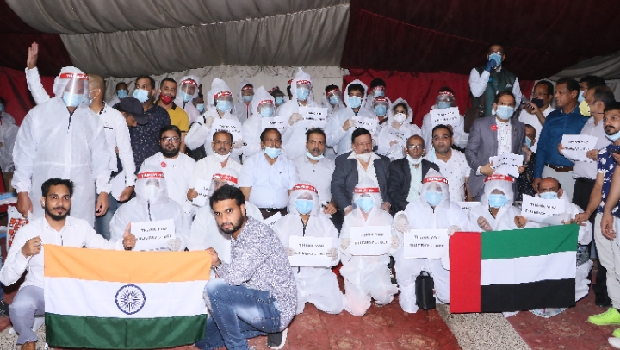
The second in the series of chartered flights arranged by Thumbay Group, UAE and the Bearys Cultural Forum (BCF) Trust, Mangalore to repatriate stranded Kannadigas in the UAE took off from Ras Al Khaimah International Airport on 25th July 2020. The flight was fully occupied with 178 passengers including the sick and elderly as well as those in need of urgent medical attention due to chronic illnesses, pregnant ladies and kids. Passengers also included those facing visa issues and job losses.
Implemented under the leadership of Dr. Thumbay Moideen - Founder President of Thumbay Group & Founder Patron of BCF and Dr. B K Yusuf - President of BCF, these repatriation flights are organized on a purely charitable basis, with all necessary steps and precautions in place to ensure the safety and comfort of passengers.
Thumbay Group assigned its fleet of buses to transport the passengers free of charge from their residences in Dubai, Sharjah and Ajman to the airport. The organizers also provided free meals and refreshments to the passengers, in addition to PPE kits and face-shields distributed free of charges.
Dr. B K Yusuf – BCF President, Dr. Kaup Mohammed - BCF General Secretary, other office bearers of BCF, as well as Thumbay Group’s representatives Mr. Farhad C – Director of the
Hospitality Division of Thumbay Group and Engr. Farwaz P. C. – COO of the Construction Division were present at the airport to see off the second group of passengers.
ARISTOCRAT Travels supported the ticketing, boarding and related processes for the passengers. Support
was also extended by social organizations including Bhatkal Jamath, Bhatkal association, BCCI, BWF, DKSC, KNRI, Kannadiga Help Line, KDKGS-UAE, Dubai Konkans, KSS and Dubai
Kannadigas.
The passengers were received at Mangalore airport under the leadership of Mr. Mumtaz Ali - patron of BCF and other distinguished personalities of Mangalore including Mr. B. M. Farookh - Hon. MLC, Mr. Moidin Bava - former MLA, Mr. U. T. Ifthikhar, Mr. S. M. R. Rashid - President of
BCCI central committee etc.The passengers were transferred to the hotels where they had registered for the mandatory quarantine.
The first flight in the series, with 186 passengers had taken off on 21st July 2020. The next flight under this joint initiative is scheduled to take-off from Ras Al Khaimah airport to Mangalore on 10th August 2020. A few more similar repatriation flights are to soon follow, in the coming weeks.














Comments
Should be jailed this driver. Hope there is no such accidents in our coastal areas. I can pray only...
Who tought him driving. who given license to him. careless fellow
Should not speed up car whilst raining
If he used fog lamp + lowered speed, might get control on car
Fool.. If he had commonsense he wont speed up car while raining heavily. Control wont get
Add new comment